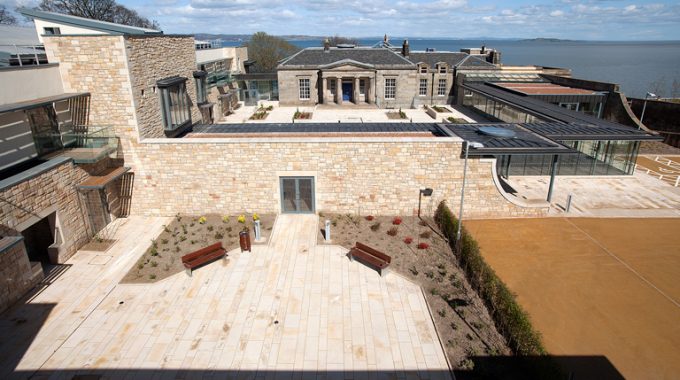
Newcastle Expertise for Edinburgh Hospice Highly Commended
Newcastle-based architects, Jane Darbyshire & David Kendall (JDDK) Ltd, have been highly commended for the £26m rebuild project of St Columba’s Hospice in Edinburgh, at the prestigious Building Better Healthcare Awards held in central London on November 5th.
The project, which opened in May, required not only exemplary healthcare design but brought together several others aspects of the practice’s expertise.
Centered around two Grade B listed buildings in a Conservation Area overlooking the Firth of Forth, the previous unsatisfactory care facilities dating from the 1970’s-90’s have now been replaced with an exceptional 30-bed hospice care facility that is a fine example of progressive vision in the UK hospice sector, and of design in a highly sensitive setting.
This project had began with conversations between JDDK Director, Ian Clarke, and the hospice back in 2006, to firm up a design brief which would take in not only the client requirements but also the site’s unique characteristics.
JDDK Director and project architect, Ian Clarke, commented, “The existing hospice was centred around a listed neoclassical house in its own grounds, within the Trinity conservation area in northern Edinburgh. The listed house had been much extended in the past, notably with the construction of a large in-patient wing about 30 years ago. The pace of development in palliative care services has meant that the existing facilities were simply no longer suitable for current or anticipated future needs.”
“We were originally engaged in early 2006 to undertake initial studies as to how the campus might be reconfigured to provide facilities suitable for the coming decades, whist satisfying the stringent requirements of Historic Scotland and Edinburgh City Council in relation to the Listed Building, its setting, and the Conservation Area. The proposals would also need to ensure continuity of the hospice’s services on site throughout the construction process.”
“It was therefore a challenging Planning Application but with the assistance of extensive dialogue with Historic Scotland and the Conservation Officers of Edinburgh City Council, we gained Planning Permission at the end of 2009.”
The use of natural materials, both internally and externally, combined with integrated landscaped areas, creates a therapeutic, diverse and holistic environment for care.
Patient safety was addressed holistically through high levels of accessibility and ‘supportive design’, fulfilling the requirements of infection control while avoiding a visually-sterile environment. Patients feel liberated through the inclusion of garden or sea views from rooms and circulation areas, garden or balcony access from each bedroom, and a simple user-friendly layout.
Consideration of futureproofing the building was integrated into the general layout through its format of wings rather than a central block, and its access arrangements. Single en-suite bedrooms provide greater flexibility and larger rooms cater for highly-complex or bariatric patients.
Sustainable features include the use of natural ventilation and lighting, solar shading, the retention of existing trees and the addition of green roofs, rainwater harvesting and plans for the installation of biomass heating.
Margaret Dunbar, Chief Executive of the Hospice, described the development as setting ‘a national benchmark in terms of hospice care environments’. Alison Allan, Project Lead at St Columb’a Hospice added, “The accolades from our patients and families using the building is the real testament to a design that has created the right environment, supporting the work we do. JDDK’s mark on the Edinburgh east coast is quite simply outstanding.”
The provision of palliative care facilities is becoming a speciality of the practice with recent projects including St Oswalds in Newcastle, St Gemma’s in Leeds, Marie Curie hospices in Glasgow and Solihull, Thorpe Hall in Peterborough for Sue Ryder Care and Marymount Hospice in Cork.
